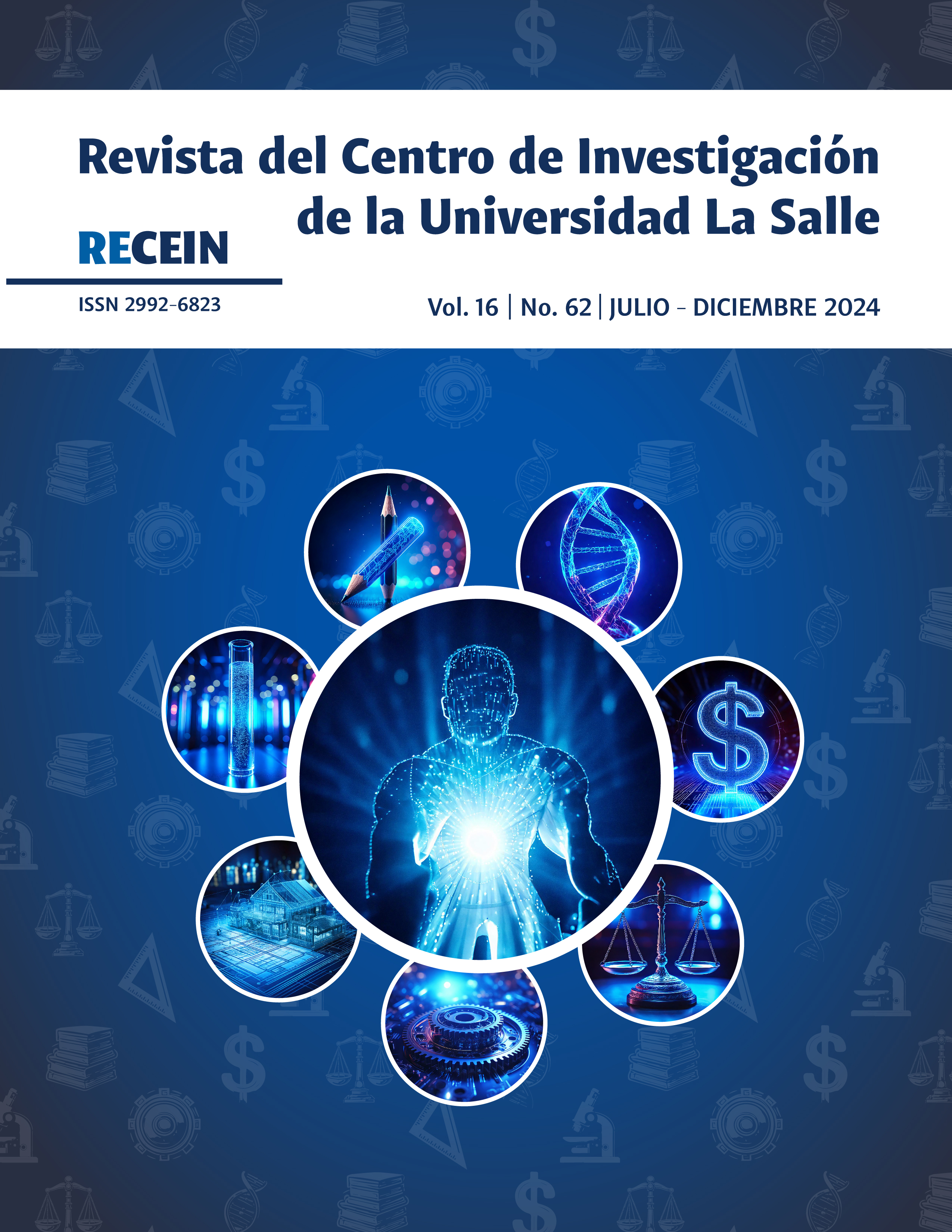An IoT health-care monitoring system design to measure vital parameters through non-invasive sensors662
Contenido principal del artículo
Resumen
- En los últimos años, han surgido nuevas enfermedades con una alta tasa de contagio y riesgos para la salud. Existe una necesidad imperante de desarrollar más aplicaciones para la atención sanitaria tanto local como remota. Este trabajo presenta una aplicación para el monitoreo de signos vitales utilizando tecnología IoT (Internet de las Cosas). El prototipo es capaz de medir la temperatura corporal, la presión arterial, el porcentaje de oxígeno y la frecuencia cardíaca, tanto de manera local como remota.
En primer lugar, las mediciones se realizan localmente utilizando los sensores correspondientes a cada una de las variables. Posteriormente, las variables son enviadas al dispositivo Particle Photon. Los datos son procesados y convertidos en los valores correspondientes a las mediciones. Estos valores de las variables se envían a la nube, lo que permite que las lecturas estén disponibles en la interfaz tanto de manera local como remota. Se utilizó un algoritmo para calcular la presión arterial a partir de la información proporcionada por el sensor de frecuencia cardíaca.
Finalmente, los datos obtenidos fueron comparados con los de medidores comerciales. Además, una de las ventajas de este dispositivo es que puede continuar funcionando de manera local en caso de una posible falla de la red Wi-Fi.
Descargas
Detalles del artículo

Esta obra está bajo una licencia internacional Creative Commons Atribución-NoComercial-CompartirIgual 4.0.
Esta revista se encuentra bajo la licencia de Creative Commons, por tanto, los autores, al postular su artículo, lo adhieren a dicha licencia.El autor puede disponer de su artículo para su archivo en repositorios institucionales o en páginas web personales, con la referencia y agradecimientos a la fuente donde se ha publicado.
Citas
Al khafajiy, M., Baker, T., Chalmers, C., Asim, M., Kolivand, H., Fahim, M., & Waraich, A. (2019). Remote health monitoring of elderly through wearable sensors. Multimed Tools Appl, 78(17), 24681-2470. https://doi.org/10.1007/s11042-018-7134-7
Alfian, G., Syafrudin, M., Ijaz, M. F., Syaekhoni, M. A., Fitriyani, N. L., & Rhee, J. (2018). A personalized healthcare monitoring system for diabetic patients by utilizing BLE-based sensors and real-time data processing. Sensors, 18(3), 2183. https://doi.org/10.3390/s18072183
Alizadeh, M., Shaker, G., Martins de Almeida, J. C., Morita, P. P., & Safavi-Naeini, S. (2019). Remote Monitoring of Human Vital Signs Using mm-Wave FMCW Radar. IEEE Access, 7(1), 54958-54968. https://doi.org/10.1109/ACCESS.2019.2912956
Bhardwaj, V., Joshi, R., & Gaur, A. M. (2022). IoT Based Smart Health Monitoring System for COVID 19. SN Computer Science, 3(2), 1-11. https://doi.org/10.1007/s42979-022-01015-1
Cheng, C. H., Wong, K. L., Chin, J. W., Chan, T. T., & So, R. H. (2018). Deep Learning Methods for Remote Heart Rate Measurement: A Review and Future Research Agenda. Sensors, 21(18), 6296. https://doi.org/10.3390/s21186296
Dey, N., Ashour, A. S., Shi, F., Fong, S. J., & Sherratt, R. S. (2017). Developing Residential Wireless Sensor Networks for ECG Healthcare Monitoring. IEEE Transactions on Consumer Electronics, 63(4), 442-449. https://doi.org/10.1109/TCE.2017.015063
Galaxy Watch4 Classic 42 mm Negro. (2022). (SAMSUNG) Retrieved marzo 13, 2022, from https://www.samsungstore.mx/galaxy-watch4-42mm/p?gclid=CjwKCAiA4KaRBhBdEiwAZi1zzgRxXd7y_SugeSw9bQqlVMpV1THO2ev5cW57badCFaSFbg34RyOxqhoC5QUQAvD_BwE
Haghi, M. (2020). A Flexible and Pervasive IoT-Based Healthcare Platform for Physiological and Environmental Parameters Monitoring. EEE Internet of Things Journal, 7(6), 5628-5647. https://doi.org/10.1109/JIOT.2020.2980432
Islam, M. S., Islam, M. T., Almutairi, A. F., Beng, G. K., Misran, N., & Amin, N. (2019). Monitoring of the human body signal through the Internet of Things (IoT) based LoRa wireless network system. Applied Sciences, 9(9), 1884. https://doi.org/10.3390/app9091884
Jamil, F., Ahmad, S., Iqbal, N., & *, D.-H. K. (2020). Towards a remote monitoring of patient vital signs based on IoT-based blockchain integrity management platforms in smart hospitals. Sensors, 20(8), 2195. https://doi.org/10.3390/s20082195
Khan, F., & Cho, S. H. (2017). A detailed algorithm for vital sign monitoring of a stationary/non-stationary human through IR-UWB radar. Sensors, 17(2), 290. https://doi.org/10.3390/s17020290
Li, J., Somers, V. K., Gao, X., Chen, Z., Ju, ;., Lin, Q., . . . Zhang, L. (2021). Evaluation of optimal diastolic blood pressure range among adults with treated systolic blood pressure less than 130 mm Hg. JAMA network open, IV(2), e2037554-e2037554. https://doi.org/10.1001/jamanetworkopen.2020.37554
Lum, T., Connolly, M., Marx, A., Beidler, J., Hooshmand, S., Kern, M., . . . Hong, M. Y. (2019). Effects of Fresh Watermelon Consumption on the Acute Satiety Response and Cardiometabolic Risk Factors in Overweight and Obese Adults. Nutrients, 11(3), 595. https://doi.org/10.3390/nu11030595
Meng, K., Chen, J., Li, X., Wu, Y., Fan, W., Zhou, Z., . . . Wang., Z. L. (2018). Flexible Weaving Constructed Self-Powered Pressure Sensor Enabling Continuous Diagnosis of Cardiovascular Disease and Measurement of Cuffless Blood Pressure. Advanced Functional Materials, XXlX(5). https://doi.org/10.1002/adfm.201806388
Mercuri, M., Hornung, R., Zhang, P., Visser, H., Hijdra, M., Liu, Y. H., . . . Torfs, T. (2021). 2-D Localization, Angular Separation and Vital Signs Monitoring Using a SISO FMCW Radar for Smart Long-Term Health Monitoring Environments. IEEE Internet of Things Journal, 8(14), 11065-11077. https://doi.org/10.1109/JIOT.2021.3051580
Misbahuddin, S., Zubairi, J. A., Alahdal, A. R., & Malik, M. A. (2018). IoT-Based Ambulatory Vital Signs Data Transfer System. Journal of Computer Networks and Communications, 2018(1), 1-8. https://doi.org/10.1155/2018/4071474
Perry, H., Sheehan, E., Thilaganathan, B., & Khalil, A. (2018). Home blood-pressure monitoring in a hypertensive pregnant population. Ultrasound in Obstetrics & Gynecology, 51(4), 524-530. https://doi.org/10.1002/uog.19023
Prasetyo, P., & Kitagawa, A. (2019). ZigBee Radio Frequency (RF) Performance on Raspberry Pi 3 for Internet of Things (IoT) based Blood Pressure Sensors Monitoring. International Journal of Advanced Computer Science and Applications(IJACSA), X(5). https://doi.org/10.14569/IJACSA.2019.0100504
Randazzo, V., Ferretti, J., & Pasero, E. (2020). A Wearable Smart Device to Monitor Multiple Vital Parameters—VITAL ECG. Electronics, 9(2), 300. https://doi.org/10.3390/electronics9020300
Reggiani, L., & Alfinito, E. (2021). Stefan-Boltzmann law revisited. Quantitative InfraRed Thermography Journal, XVIII(4), 269-282. https://doi.org/10.48550/arXiv.2112.12090
Ruonan, L., Xuelian, W., Jiahui, X., Junhuan, C., Bin, L., Zhiyi, W., & Lin, W. Z. (2021). Smart wearable sensors based on triboelectric nanogenerator for personal healthcare monitoring. Micromachines, 12(4), 352. https://doi.org/10.3390/mi12040352
Sarzynski, M. A., Rankinen, T., Earnest, C. P., Leon, A. S., Rao, D. C., Skinner, J. S., & Bouchard, C. (2013). Measured Maximal Heart Rates Compared to Commonly Used Age-Based Prediction Equations in the Heritage Family Study. American Journal of Human Biology, 25(5), 695-701. https://doi.org/10.1002/ajhb.22431
Subandi, Budi Nugroho, A. S., Nurkamilia, & Akhrian, S. A. (2021). Body Temperature Measurement Tool for Early Detection of COVID-19 Based on Interactive Argumented Reality Technology and Sensor MLX90614: Framework and Prototyping. JURIKOM (Jurnal Riset Komputer), VIII(5), 141-148. http://dx.doi.org/10.30865/jurikom.v8i5.3622
Swaroop, K. N., Chandu, K., Gorrepotu, R., & Deb, S. (2019). A health monitoring system for vital signs using IoT. Internet of Things, 5(1), 116-129. https://doi.org/10.1016/j.iot.2019.01.004
Talal, M., Zaidan, A. A., Albahri, A. S., Alamoodi, A. H., Albahri, O. S., Alsalem, M. A., . . . Mohammed, K. I. (2019). Smart Home-based IoT for Real-time and Secure Remote Health Monitoring of Triage and Priority System using Body Sensors: Multi-driven Systematic Review. Journal of medical systems, 43(3), 1-34. https://doi.org/10.1007/s10916-019-1158-z
Tang, X., Du, R. H., Wang, R., Cao, T. Z., Guan, L. L., & Yang, C. Q. (2020). Comparison of hospitalized patients with ARDS caused by COVID-19 and H1N1. Chest, 158(1), 195-205. https://doi.org/10.1016/j.chest.2020.03.032
Wu, F., Wu, T., & Yuce, M. R. (2018). An internet-of-things (IoT) network system for connected safety and health monitoring applications. Sensors, 19(1), 21. https://doi.org/10.3390/s19010021
 English
English


